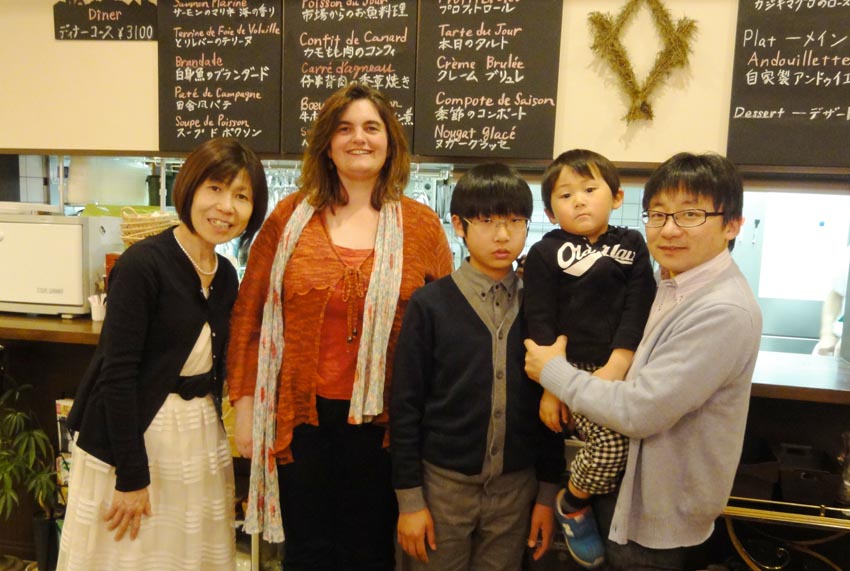Arlette Oçafrain has been living in Paris last 16 years, but she was born in San Francisco and raised in Donazaharre (Lower Navarre) and has lived in Japan. She speaks five languages and proudly self-defines as a Basque of the Diaspora.
basque heritage worldwide

07/17/2015

ADVERTISING
Arlette Oçafrain has been living in Paris last 16 years, but she was born in San Francisco and raised in Donazaharre (Lower Navarre) and has lived in Japan. She speaks five languages and proudly self-defines as a Basque of the Diaspora.
Joseba Etxarri. Her Parisian business card reads “Technology intelligence analyst.” She studied physical chemistry and material sciences and got her Ph.D. at the University of Bordeaux to later reside in Japan for two years dedicating herself to research in the privileged surroundings of the City of Science of Tsukuba. In her personal life, she enjoys singing, and especially traditional Basque singing that came to her on her father’s side from Banka and her mother’s from Jatsu Garazi, both located in Baxenabarre. In each place that she has lived, Arlette has enjoyed singing and today she continues transmitting that love and commitment to new generations at the Paris Basque club along with her emotion and devotion to the musical poetry that many Basque songs are.
In California, Basques often speak four languages, since a large number of the emigrants there know Basque, Spanish, French and English. You add Japanese to those.
-I lived for two years in Japan and had the opportunity to gain a basic knowledge of the language. I am not fluent, and can’t write it, but I learned enough to carry out a normal conversation, non-professional.
In 2010 you surprised some with a version of Hegoak sung by you in Japanese on Youtube.
-I like to sing and somebody asked me to sing it and he recorded it. Singing in Japanese is easy for a Basque. It must have been 1996 or 1997 when I met Sho Hagio there, a Japanese who learned Basque and who has since then written various books in Japanese on the Basques. Today we can say that there is a group of Basque-speaking Japanese like Sho. Later I coincided with him at the World Congress of Basque Communities where he was representing Tokyo’s Basque club, that didn´t exist that time, while I was representing the Paris Basque club.
You have both an Americ an and French Passport.
-I was born in San Francisco and when I was 11 I returned to the Basque Country with my family, to Donazaharre in Iparralde. I was raised there and lived there until I went to university and since then I have always lived elsewhere. First in Bordeaux, later in Japan and now since 1999 in Paris.
You were a member of the Bordeaux Basque Club and you are now one at the Paris Basque Club.
-During my university years I attended and was very active in the Bordeaux Basque club; and in Paris, I lived in the hostel that the club has for Basque youth for two weeks after arriving in Paris. A couple of years later, I became part of its activities and since its move in 2003 to its new location in St. Ouen, I have served on the board of directors of the club, as well as serving as secretary and treasurer. We have organized interesting things, meetings with other European Basque clubs…
In Paris you try to transmit your passion for song to the youth.
-Right now I teach a small group of kids who are very motivated and it is going really well. They are between the ages of 12 and 18 and we have adapted to Euskera and have done various versions of international songs, for example, for Pariseko Herri Urrats. I really enjoy the traditional songs. Also singing with a choir, but particularly singing popular songs in one or two voices and there is little doubt that I want it to endure.
You feel a little bit from each place that you have lived in?
-I think basically I feel Basque, linked to Donazaharre, where my parents still live….Maybe more precisely, I would say that I feel like a Basque from the Diaspora. Ifeel very comfortable in the Basque atmosphere in the Diaspora and I try to contribute from there. For work reasons, I travel to many places around the world and when I arrive, I always check to see if there is a Basque club and if so, I try to visit. I usually try find a Basque connection in places where I go, but that doesn’t occur to me with French or American stuff.
In January you debuted Makila in Paris, a Basque music, song and dance show “Made in Paris.”
-It was the result of a lot of work, effort and enthusiasm, with 20 dancers, 20 singers and 5 musicians on stage at the Armande-Bejard Theater and it was a success. We will perform it again in November in Dijon and just before Christmas in Iparralde, in Luhuso.
When was the last time that you were in the Basque Country and when will you go back?
-I was there in April and will go back next week (smile).
ADVERTISING
ADVERTISING
ADVERTISING
ADVERTISING
ADVERTISING
© 2014 - 2019 Basque Heritage Elkartea
Bera Bera 73
20009 Donostia / San Sebastián
Tel: (+34) 943 316170
Email: info@euskalkultura.eus